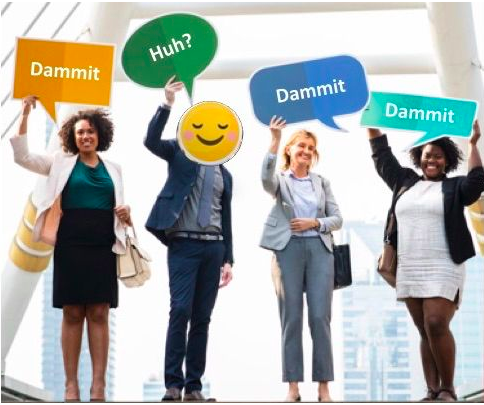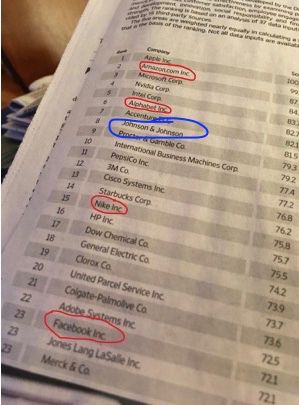Ladies Swearing at Work: Members Only #7

I unpaywalled this post on 1/29/23, and for now it's out here as originally published. Sadly, the tweets way back in 2018 I quoted are not rendering here; thanks Elon. There may be broken links. I may go back and fix them and make other edits.
I was excited to hear from some of you about last month’s newsletter! Thank you for writing.
On Caitlin Rosenthal’s Accounting for Slavery, CV Harquail wrote:
“The connection between slavery and modern management systems is painful, real, and largely denied. Rosenthal isn't the first to make this connection although her book is recent and comprehensive -- I cite it back to Modern Slavery As A Management Practice: Exploring the Conditions and Capabilities for Human Exploitation, Andrew Crane, Academy of Management Review Volume 38, Issue 101 Jan 2013.)”
On my exploration of Andy Grove’s High Output Management. Michele Spiezia asked,
“High Output? Is that what really matters?”
I think today we’d call it scaling. And what a great, great question.
(And I love hearing from you, and I’ll never quote you without your permission.)
Andy & me
My copy of High Output Management is blurbed, “An organizational Baedeker for managers at all levels - The New York Times”
I can only define Baedeker because teenaged me read a boatload of Agatha Christie.
To be clear, I own an older edition of High Output Management — the battered paperback is older than some of the tech readers who claim to love it.
Recap for new subscribers: trying to figure out why this book is being lauded, I’ve been reading 50 pages at a time, and sharing my thoughts here.
(pp. 1-50.) (pp. 50-100.)
I read a lot, and I read fast. Living with this book over the past few months has been different and enjoyable.
Somewhere in pages 101-150, I started to appreciate a few things about High Output Management.
It’s well written.
It’s dense. A chapter on making decisions is shorter than a TED talk, roughly 14 pages of a small paperback.
Grove presents few absolutes, and doesn’t claim to own anything about the discipline of management. Nor is he claiming to be a management innovator.
One exception, thus far, is about organizational form.
I’d like to propose a Grove’s law, “All large organizations with a common business purpose end up in a hybrid organizational form.”
He describes an organization where overhead/shared resources exist under one organizational umbrella. Locally managed, specialized organizations share those resources. So, for example, Intel had a marketing team that covered all of their products.
(Unclear as to why this needed to be a “law,” as it wasn’t invented at Intel. Maybe it’s a tongue-in-cheek nod to colleague Gordon Moore?)
Grove doesn’t talk about leadership with a capital-L. (In fact, I don’t recall use of the l-word at all.)
Instead, he’s describing what worked at Intel, back in the day.
Grove also realizes that he’s part of a complex system. He embraces the imperfection and messiness of the human side of business.
And he advocates for process and planning.
As of page 150, he has not claimed to have created the OKR. Lol. Indeed, he uses the term Management by Objective.
Apparently, it was John Doerr who annointed Grove as Father of the OKR, possibly in his recent book, which I am actively not reading.
Simultaneously, I am still not reading Blitzscaling.
I’ll take retro legal strategies for $200, Alex

After considering a lawsuit, Ms. Dushku entered into mediation with CBS. Mark Engstrom, the chief compliance officer at CBS, participated, along with Bettina B. Plevan, a partner at the law firm Proskauer Rose, who was serving as outside counsel for the company.
Mr. Engstrom handed over outtakes from “Bull” in the belief that they would help the company’s cause, because they showed Ms. Dushku cursing on the set, investigators wrote in the draft of their report.
The strategy backfired. The outtakes were a “gold mine” for Ms. Dushku, the lawyers wrote, because they “actually captured some of the harassment on film.”
CBS Paid the Actress Eliza Dushku $9.5 Million to Settle Harassment Claims
So, the CBS Chief Compliance Officer — an attorney — could watch a video of an employee being harassed. On tape.
And instead of seeing harassment, he saw a Lady Swearing in the Workplace. And then, he thought it would help him to win his harassment case.
A Lady Swore at Work was a legal strategy?
Well…
Once upon a time, close enough to when Cybill Sheperd reports having been sidelined after turning down CBS’ Les Moonves, someone “left the firm” where I was a manager.
Weeks later, I was shown a letter from their attorney. One of many grievances listed? His department’s manager routinely used foul language.
That manager, dear reader, was me. Hello, it was banking.
(And yes, the bank paid the guy off.)
Disillusionment Charm
Maybe what I’ve been calling failure to respond is, actually, a failure to see.
I’m at a loss for how this happens. Except that there are things I can’t see, too.
Like, why people don’t see problems in their workplaces.
ICYMI, here’s my article on what you need to figure out how to see.
Rankings are garbage
I get home delivery of the actual Wall Street Journal. Sometimes the physical form of the paper gives me the chance to actually see things differently.
The hard copy of the Management Top 250, a ranking of the “best managed companies” hit me hard.
The ranking was developed by the Drucker Institute, a part of Claremont Graduate University that seeks to help organizations to do “the right things well.”
The ranking is based on the institute’s measures of customer satisfaction, employee engagement/development, innovation, social responsibility and financial strength.
So, what’s wrong with this picture?

The WSJ’s own reporting might call some of this management excellence into question.
For example, 20,000 people walked off the job at Google weeks before the rankings were published. (Alphabet is ranked #6.)
Stories of Not-Best Management I can think about off the top of my head:
- Working conditions at Amazon (ranked #2)
- Sexual harassment claims at Nike (ranked #15)
- Facebook and privacy (ranked #23)
In my recent audio conversation with Francine McKenna on the Shareholder Value Myth, I referenced the Johnson & Johnson Credo — specifically because the value system they espouse is not shareholder-centric.
On December 14, Reuters reported that Johnson & Johnson knew for decades that asbestos lurked in its Baby Powder. If true, a violation of their Credo. (J&J is ranked #8.)
While still ruminating on the WSJ Management 250, I received an email about another ranking: the most Just companies of 2018.
What, you may ask, is a Just company?
For one thing, it’s a company that might be included in an investment vehicle recently launched by Goldman Sachs Asset Management, in some kind of alliance that is not entirely clear to me* with not-for-profit Just Capital.
The JUST ETF invests in U.S. companies that are driving positive change on some of the most pressing social issues of our time – including worker pay and well-being, customer treatment and privacy, beneficial products, the environment, job creation, strong communities, and more – all anchored directly to the values and priorities of the American people as identified through JUST Capital’s polling.
The 3rd most Just company? Alphabet. Facebook comes out at number 35.
As for the Drucker Institute, well, stay in touch:
Investment-related news is coming very soon.
*To the level I’ve read thus far, I’m confused.
Missionwashing and libraries
So, I’ve been gnawing away at missionwashing. In my loose definition, it’s when an organization uses its mission as a reason to cut corners.
I’ve also been thinking about spiritual bypass, a term I think comes from the recovery movement.
Spiritual bypass, as I understand it, is when we think we’ve got everything covered, transcendently-speaking.
We’re going to church every Sunday, or meditating every day, or (pick your practice).
We then use our quest for enlightenment to avoid doing real work to change deeper patterns that aren’t healthy.
We’ve taken the ring road around our own human nature. We’re bodhisattvic poseurs.
In the workplace, see, “Our organization is changing the world,” and Theranos and More Than Me.
While I ruminated, Fobazi Ettarh’s definition of “vocational awe” crossed my feed.
It’s good.
…simply put, it is the idea that libraries as institutions are inherently good. It assumes that some or all core aspects of the profession are beyond critique, and it, in turn, underpins many librarians’ sense of identity and emotional investment in the profession…
Vocational Awe? by Fobazi Ettarh
I’m starting to dive more of Ettarh’s writing on vocational awe — the articles are about libraries and librarians, and yet this important concept transcends domain.
Vocational awe seems to contain enough space for the quasi-religious trappings that go with the territory in some “mission-driven” organizations.
More to come.
Links
- Nearly all sexual harassment at work goes unreported – and those who do report often see zero benefit, by Carly McCann and Donald T. Tomaskovic-Devey, at The Conversation.
- Michele Spiezia’s note to me also mentioned Douglas Rushkoff’s podcast Team Human, which I plan to check out.
- If you enjoy fiction, Unlikeable Female Characters is a fun new podcast that’s sort of like eavesdropping on a book club whose members are authors.
Office Hours, and The Gift Of Anne (lol)
- Substack has encouraged us to offer gift subscriptions. I’m not sure that Members Only is a great gift. It’s a bit particular, and still evolving.
Also, the gift of email seems like a bad idea. Fight me.
(That said, if you have an expense budget, or your boss does, give yourself the gift of asking if you can expense your membership. Which you have already paid for!)
- Office Hours are Thursday, December 20. Talk to me about anything workplace, via Zoom! Sign up here by Wednesday am.
- A few years back, I wrote a couple of super-simple guides for new managers. One is about performance reviews, and the other is about 1:1 meetings, and I recently revised them both.
Don’t buy them.
You will find the guides, free and downloadable at this Dropbox link. I’ll leave them there until mid-January.
Thanks so much for reading and supporting On Management! If you have a question or topic I should cover — or a comment on this issue, please send me a note.
Also, I’m curious, did you like the transcript of my last audio, Francine McKenna and the Myth of Shareholder Primacy? Should I continue to offer transcripts?
Thanks so much!
P.S. ICYMI:
- Audio Transcript: Francine McKenna and the Myth of Shareholder Primacy (Members Only)
- The Power of Myth (in Business): On Management #33
- History Is For Us To Make, Every Day: Members Only #6

Here’s hoping Eliza Dushku is five by five…or well on her way.




